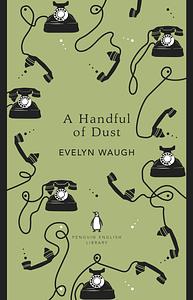Take a photo of a barcode or cover
medium-paced
Plot or Character Driven:
Character
Strong character development:
No
Loveable characters:
No
Diverse cast of characters:
No
Flaws of characters a main focus:
Yes
The plot was decent I just absolutely despised how this was written
Also I thought Evelyn Waugh was a woman so imagine my ANGUISH when I found out he was in fact a man
Also I thought Evelyn Waugh was a woman so imagine my ANGUISH when I found out he was in fact a man
This was an interesting exercise in irony and just deserts.
Reading Evelyn Waugh’s novel A Handful of Dust around the time that the British voted to leave the European Union, was an unplanned but intriguing coincidence. The novel is an allegory of crisis in European civilization.
On one level, it is a simple story. Tony Last, of the aristocratic class, is married to Brenda. The marriage, after seven years, has become somewhat of a routine. Tony is a traditionalist who cares mostly about keeping up his estate, Hetton. Brenda has a more adventurous streak and longs for a change of pace. And so she takes a lover, John Beaver, a middle class man. Then a dramatic event occurs, the marriage falls apart, Tony travels abroad - to British Guyana - to be away from it all, so to say. The expedition does not go well, and he ends up with no prospect of returning to his homeland. Brenda finally marries another man and Tony’s heirs take over the estate.
Evelyn Waugh delivers this story with his trademark sense of humour, and his portrayal of the decadence of the British upperclass in their clubs and homes makes for entertaining reading.
One another level, this novel has a lot more to say.
A Handful of Dust takes its title from a line from T.S. Eliot’s famous poem The Waste Land. The poem, published in 1922, is a modernist poet’s take on the atrocities and absurdities of a devastating war, that left mankind facing deep-running questions about morality. Waugh must have had deeper intentions in taking the title for his novel from this multi-layered, enigmatic poem.
In this poem, another line reads: ‘There is an empty chapel, only the wind’s home’ (line 388). The empty chapel; it can be seen to stand for man’s loss of faith in god. Shortly before he published A Handful of Dust, Waugh wrote in an essay: ’in the present phase of European history the essential issue is no longer between Catholicism, on one side, and Protestantism, on the other, but between Christianity and Chaos’. He further wrote: ‘Civilization’ – by which he meant European civilization – ‘has not in itself the power of survival. It came into being through Christianity, and without it has no significance or power to command allegiance.’
An empty chapel… On a metaphorical level the ‘empty chapel’ supersedes the religious confinements and can be made pertinent to a broader, more general set of moral beliefs.
Seen in this light, A Handful of Dust deals with the issue of morality versus chaos. What kind of society do we want to be?
Just as the quest for the grail is one of the motives of Eliot’s poem, in A Handful of Dust Tony sets out to the Brazilian jungle on a quest (in a chapter aptly called ‘In search of a City’), to escape the chaos that his life in Britain has become, to find a ‘City’, one to replace the depraved London he hails from, you could think. He does not find a city, and, in the jungle, he becomes very ill and finally falls in the hands of a Mr. Todd. From Mr. Todd’s secluded little spot in the jungle, there is no escaping, and Tony ends up having to read aloud novels by Dickens to Mr. Todd, who cannot read himself. The similarity between the name Todd and the German word for death, Tod, cannot be missed. After all, it is ashes to ashes, dust to dust… all that will remain, in the end, is a handful of dust.
Unless, perhaps, hopefully, we find a way to fill the empty chapel.
As the European Union faces the deepest crisis of its existence, after Britain’s choice for Brexit, will we find enough common ground, or will we face chaos? Will Europe recede to a handful of dust? Will Europe become a waste land? Will we find a way to unite in our (metaphorical) chapel?
It is a sign of Waugh’s mastery that his novel, 80 years after its publication, can spark such questions about the world we live in today.
On one level, it is a simple story. Tony Last, of the aristocratic class, is married to Brenda. The marriage, after seven years, has become somewhat of a routine. Tony is a traditionalist who cares mostly about keeping up his estate, Hetton. Brenda has a more adventurous streak and longs for a change of pace. And so she takes a lover, John Beaver, a middle class man. Then a dramatic event occurs, the marriage falls apart, Tony travels abroad - to British Guyana - to be away from it all, so to say. The expedition does not go well, and he ends up with no prospect of returning to his homeland. Brenda finally marries another man and Tony’s heirs take over the estate.
Evelyn Waugh delivers this story with his trademark sense of humour, and his portrayal of the decadence of the British upperclass in their clubs and homes makes for entertaining reading.
One another level, this novel has a lot more to say.
A Handful of Dust takes its title from a line from T.S. Eliot’s famous poem The Waste Land. The poem, published in 1922, is a modernist poet’s take on the atrocities and absurdities of a devastating war, that left mankind facing deep-running questions about morality. Waugh must have had deeper intentions in taking the title for his novel from this multi-layered, enigmatic poem.
In this poem, another line reads: ‘There is an empty chapel, only the wind’s home’ (line 388). The empty chapel; it can be seen to stand for man’s loss of faith in god. Shortly before he published A Handful of Dust, Waugh wrote in an essay: ’in the present phase of European history the essential issue is no longer between Catholicism, on one side, and Protestantism, on the other, but between Christianity and Chaos’. He further wrote: ‘Civilization’ – by which he meant European civilization – ‘has not in itself the power of survival. It came into being through Christianity, and without it has no significance or power to command allegiance.’
An empty chapel… On a metaphorical level the ‘empty chapel’ supersedes the religious confinements and can be made pertinent to a broader, more general set of moral beliefs.
Seen in this light, A Handful of Dust deals with the issue of morality versus chaos. What kind of society do we want to be?
Just as the quest for the grail is one of the motives of Eliot’s poem, in A Handful of Dust Tony sets out to the Brazilian jungle on a quest (in a chapter aptly called ‘In search of a City’), to escape the chaos that his life in Britain has become, to find a ‘City’, one to replace the depraved London he hails from, you could think. He does not find a city, and, in the jungle, he becomes very ill and finally falls in the hands of a Mr. Todd. From Mr. Todd’s secluded little spot in the jungle, there is no escaping, and Tony ends up having to read aloud novels by Dickens to Mr. Todd, who cannot read himself. The similarity between the name Todd and the German word for death, Tod, cannot be missed. After all, it is ashes to ashes, dust to dust… all that will remain, in the end, is a handful of dust.
Unless, perhaps, hopefully, we find a way to fill the empty chapel.
As the European Union faces the deepest crisis of its existence, after Britain’s choice for Brexit, will we find enough common ground, or will we face chaos? Will Europe recede to a handful of dust? Will Europe become a waste land? Will we find a way to unite in our (metaphorical) chapel?
It is a sign of Waugh’s mastery that his novel, 80 years after its publication, can spark such questions about the world we live in today.
funny
lighthearted
slow-paced
Plot or Character Driven:
Character
Strong character development:
No
Loveable characters:
No
Diverse cast of characters:
No
Flaws of characters a main focus:
Yes
I did not see this ending coming but I like to be surprised. A sobering reminder to make good choices.
medium-paced
Plot or Character Driven:
Character
Strong character development:
No
Loveable characters:
No
Diverse cast of characters:
No
Flaws of characters a main focus:
Yes
dark
funny
medium-paced
Plot or Character Driven:
Character
Strong character development:
No
Loveable characters:
No
Diverse cast of characters:
No
Flaws of characters a main focus:
Yes
challenging
reflective
slow-paced
Plot or Character Driven:
Character
Loveable characters:
No
Flaws of characters a main focus:
Yes
adventurous
dark
mysterious
sad
fast-paced
dark
slow-paced
Plot or Character Driven:
A mix
Strong character development:
Yes
Loveable characters:
Complicated
Diverse cast of characters:
Complicated
Flaws of characters a main focus:
Complicated




